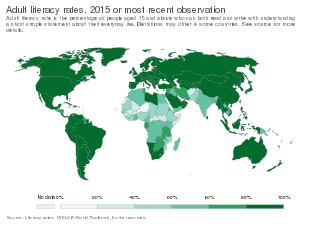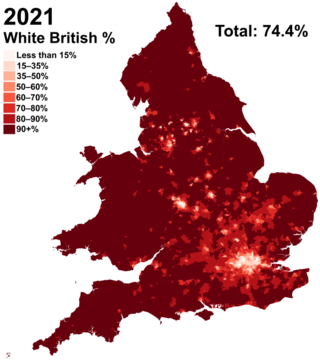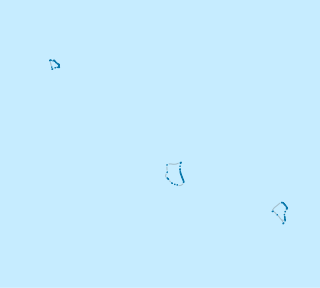Tokelauan reading
As of 2011, less than 1% of Tokelauans are unable to read in the Tokelauan language, with little variation due to age. 90.4% of Tokelauans reported being 'good' or 'very good' at reading Tokelauan.

In 2011, the Tokelauan Census for the first time asked a series of questions about reading and writing skills.
As of 2011, less than 1% of Tokelauans are unable to read in the Tokelauan language, with little variation due to age. 90.4% of Tokelauans reported being 'good' or 'very good' at reading Tokelauan.

In the Tokelauan Census of 2011, it was found that age played a major part in determining English reading skills - 75.5% of Tokelau residents aged 15 years or over reported having 'good' or 'very good' English reading skills, whereas only 9.1% of Tokelauans aged 75 or over reported this.
No significant distinction could be found between the gender balance of those that reported having 'very good' English reading skills, however illiteracy in English is more common in Tokelauan females than in Tokelauan males.
Just under 90% of Tokelauans, as of 2011, claim to have 'good' or 'very good' skills in Tokelauan writing. Only 1.4% of Tokelauans are unable to write in the Tokelauan language.
The proportion of females in Tokelau with 'very good' English writing skills is greater than that of Tokelauan males. However the proportion of Tokelauan females that cannot write in English at all is also greater than that of Tokelauan males.
Middle aged people were found to have the best English writing skills, with 85.5% of Tokelauans aged between 30 and 49 years reporting 'good' or 'very good' English writing ability.

Literacy in its broadest sense describes "particular ways of thinking about and doing reading and writing" with the purpose of understanding or expressing thoughts or ideas in written form in some specific context of use. In other words, humans in literate societies have sets of practices for producing and consuming writing, and they also have beliefs about these practices. Reading, in this view, is always reading something for some purpose; writing is always writing something for someone for some purpose. Beliefs about reading, writing and their value for society and for the individual always influence the ways literacy is taught, learned, and practiced.

The demographics of New Zealand encompass the gender, ethnic, religious, geographic, and economic backgrounds of the 5.1 million people living in New Zealand. New Zealanders predominantly live in urban areas on the North Island. The five largest cities are Auckland, Wellington, Christchurch, Hamilton, and Tauranga. Few New Zealanders live on New Zealand's smaller islands. Waiheke Island is easily the most populated smaller island with 9,420 residents, while Great Barrier Island, the Chatham and Pitt Islands, and Stewart Island each have populations below 1,000. New Zealand is part of a realm and most people born in the realm's external territories of Tokelau, the Ross Dependency, the Cook Islands and Niue are entitled to New Zealand passports.

Tokelau is a dependent territory of New Zealand in the southern Pacific Ocean. It consists of three tropical coral atolls: Atafu, Nukunonu, and Fakaofo. They have a combined land area of 10 km2 (4 sq mi). The capital rotates yearly among the three atolls. In addition to these three, Swains Island, which forms part of the same archipelago, is the subject of an ongoing territorial dispute; it is currently administered by the United States as part of American Samoa. Tokelau lies north of the Samoan Islands, east of Tuvalu, south of the Phoenix Islands, southwest of the more distant Line Islands, and northwest of the Cook Islands.

Tuvaluan, often called Tuvalu, is a Polynesian language closely related to the Ellicean group spoken in Tuvalu. It is more or less distantly related to all other Polynesian languages, such as Hawaiian, Māori, Tahitian, Samoan, Tokelauan and Tongan, and most closely related to the languages spoken on the Polynesian Outliers in Micronesia and Northern and Central Melanesia. Tuvaluan has borrowed considerably from Samoan, the language of Christian missionaries in the late 19th and early 20th centuries.
Tokelauan is a Polynesian language spoken in Tokelau and historically by the small population of Swains Island in American Samoa. It is closely related to Tuvaluan and is related to Samoan and other Polynesian languages. Tokelauan has a co-official status with English in Tokelau. There are approximately 4,260 speakers of Tokelauan, of whom 2,100 live in New Zealand, 1,400 in Tokelau, and 17 in Swains Island. "Tokelau" means "north-northeast".

Atafu, formerly known as the Duke of York Group, is a group of 52 coral islets within Tokelau in the south Pacific Ocean, 500 kilometres north of Samoa. With a land area of 2.5 square kilometres, it is the smallest of the three islands that constitute Tokelau. It is an atoll and surrounds a central lagoon, which covers some 15 km2 (5.8 sq mi). The atoll lies 800 kilometres south of the equator at 8° 35' South, 172° 30' West.

Nukunonu is the largest atoll within Tokelau, a dependency of New Zealand, in the south Pacific Ocean. It comprises 30 islets surrounding a central lagoon, with about 5.5 km2 (2.1 sq mi) of land area and a lagoon surface area of 109 km2 (42 sq mi). Motuhaga is the only islet that has inhabitants. It has an estimated population of 448.

The politics of Tokelau takes place within a framework of a parliamentary representative democratic dependency. The head of state of Tokelau is King Charles III in right of his Realm of New Zealand, who is represented by an Administrator. The monarch is hereditary, the Administrator is appointed by the New Zealand Minister of Foreign Affairs and Trade.

Swains Island is a remote coral atoll in the Tokelau Islands in the South Pacific Ocean. The island is the subject of an ongoing territorial dispute between Tokelau and the United States, which has administered it as part of American Samoa since 1925. Privately owned by the family of Eli Hutchinson Jennings since 1856, Swains Island was used as a copra plantation until 1967. It has not been permanently inhabited since 2008 but has often been visited by members of the Jennings family, scientific researchers, and amateur radio operators.

The educational attainment of the U.S. population refers to the highest level of education completed. The educational attainment of the U.S. population is similar to that of many other industrialized countries with the vast majority of the population having completed secondary education and a rising number of college graduates that outnumber high school dropouts. As a whole, the population of the United States is spending more years in formal educational programs. As with income, levels differ by race, age, household configuration, and geography.

White British is an ethnicity classification used for the native white population identifying as English, Scottish, Welsh, Cornish, Northern Irish, or British in the United Kingdom Census. In the 2011 census, the White British population was 49,997,686, 81.5% of Great Britain's total population. For the United Kingdom entirely, due to different reporting measures within Northern Ireland which includes all those who identified as British with those who identified as Irish, an amalgamated total of 52,320,080 including those who identified as White Irish in Great Britain is given making up 82.8% of the population.

English is the predominant language and a de facto official language of New Zealand. Almost the entire population speak it either as native speakers or proficiently as a second language. The New Zealand English dialect is most similar to Australian English in pronunciation, with some key differences. The Māori language of the indigenous Māori people was made the first de jure official language in 1987. New Zealand Sign Language (NZSL) has been an official language since 2006. Many other languages are used by New Zealand's minority ethnic communities.

Lesbian, gay, bisexual, and transgender (LGBT) persons in Tokelau face legal challenges not experienced by non-LGBT residents. Both male and female same-sex sexual activity are legal in Tokelau, but same-sex couples and households headed by same-sex couples are not eligible for the same legal protections available to opposite-sex married couples.

Foua Toloa was a Tokelauan politician who served as the Head of the Government of Tokelau, or Ulu, from 21 February 2009, to 21 February 2010. He was a member of the Council for the Ongoing Government of Tokelau, and was a faipule on Fakaofo. As the office of Ulu rotates on an annual basis, Toloa resumed office on 21 February 2011. For a time in 2011-2012, he was also Tokelau's minister for Finance, Telecommunication, Energy and Transport.

Tokelau has two official languages: Tokelauan and English. Over 90% of the population speaks Tokelauan, and just under 60% speak English. Also, 45.8% of the population speak Samoan, and small percentages of the population speak Tuvaluan and Kiribati.
Internet in Tokelau is provided by Teletok, the government-owned communications corporation, and Taloha Inc., a private company formed by the Dutch Joost Zuurbier.

The vast majority of people in Tokelau are Christians and Christianity plays a significant role in the Tokelauan way of life.
Smoking in Tokelau is prevalent, with ethnic Tokelauans having the highest smoking prevalence of all Pacific ethnicities. In the 2011 Tokelau Census, 47.8% of people aged over 15 were found to be regular cigarette smokers.
As prescribed in the Constitution of Tokelau, individual human rights are those found in the Universal Declaration of Human Rights and reflected in the International Covenant on Civil and Political Rights. When exercising these rights, there must be proper recognition of the rights of others and to the community as a whole. If an individual believes their rights have been breached they may go to the Council for the Ongoing Government who may make any appropriate order to protect that individual’s rights. There have been no such complaints to date.

The COVID-19 pandemic in Tokelau is part of the ongoing worldwide pandemic of coronavirus disease 2019 caused by severe acute respiratory syndrome coronavirus 2. Tokelau reported its first confirmed case on 21 December 2022. COVID-19 reached all three of Tokelau's main atolls in July 2023, when the government confirmed the community spread of the virus on Fakaofo, the last atoll without infections.